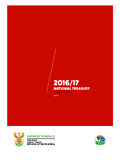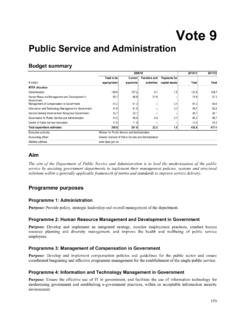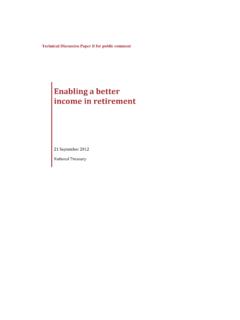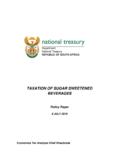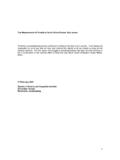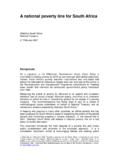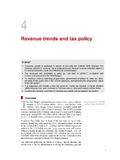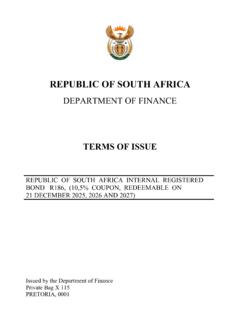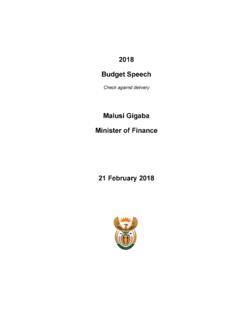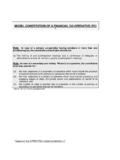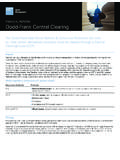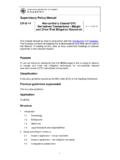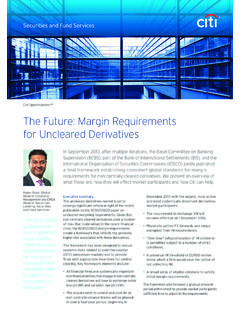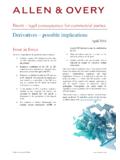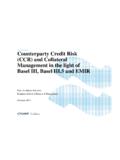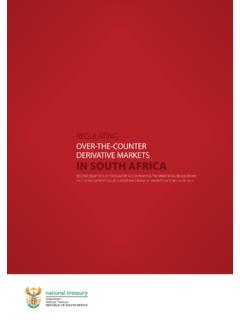Transcription of MINISTERIAL REGULATIONS AND NOTICES …
1 comments RECEIVED ON FMA MINISTERIAL REGULATIONS AND BOARD NOTICES , JUNE 2015 Page 1 of 71 MINISTERIAL REGULATIONS AND NOTICES COMMENT matrix July 2016 COMMENTATORS 1. Nedbank 2. Strate 3. JSE 4. Interdealer Broker Forum (IDBF) 5. IG Markets 6. Purple group 7. Peregrine 8. Banking Association of South Africa (BASA) 9. Granite 10. LCH Clearnet 11. DTCC 12. Barclays Africa Group 13. Old Mutual Investment group 14. ACTSA/SABM iller comments RECEIVED ON FMA MINISTERIAL REGULATIONS AND BOARD NOTICES , JUNE 2015 Page 2 of 71 MINISTERIAL REGULATIONS COMMENTATOR SECTION comments RESPONSES GENERAL comments Barclays Africa Policy document-phase in stages G20 Commitments Although we fully support the need to meet South Africa s G20 commitments and appreciate that, in terms of implementation.
2 South Africa is lagging behind most other jurisdictions. We are not supportive of a big-bang implementation approach. To provide certainty of application and to avoid market disruption, we recommend a phased- in implementation approach, as follows Phase 1: Authorisation of OTC derivatives providers (ODPs) over a six to 12 month period with distinction between types of ODPs and the priority for market participants to be authorised as ODPs. For example, affected banks and affected non-bank market participants should be required to apply for authorisation within six months and 12 months, respectively, of the commencement of the REGULATIONS and the Board NOTICES - Criteria for Authorisation as an Over-The-Counter Derivatives Provider and Code of Conduct.
3 This phase-in approach will enable and ensure efficient and timely processing of applications by the FSB; Phase 2: Mandate reporting after six months of the commencement of the REGULATIONS and the authorisation/ recognition of Trade Repository, for a period of 12 to 18 months, including phasing by asset class, product type and the back-loading process. The intelligence gathered from the data reported and a quantitative impact study (QIS), advocated below would provide the national authorities with the information required to determine how and when clearing should be mandated and how and when the margining for non-centrally cleared OTC derivatives requirements should be implemented.
4 In general we agree with a phased in approach. Please refer to the explanatory statement to give an indication of the proposed implementation. The following should be noted: Clearing is not mandated in the current Regulation, but the intention is to mandate at some point. We do not agree with different periods for different providers as such the REGULATIONS and NOTICES have at least a phase-in period of 12 months from effective date for all should be sufficient. The registrar has exemption powers for specific cases. The requirement to report must be put into place but period will be extended to allow for this.
5 We disagree that ODPs need to be comments RECEIVED ON FMA MINISTERIAL REGULATIONS AND BOARD NOTICES , JUNE 2015 Page 3 of 71 COMMENTATOR SECTION comments RESPONSES Phase 3: Mandate clearing for ODPs and systemically important counterparties (covered entities), including phasing by asset class, product type and the back-loading process, after at least six months of reported transaction data has been collated and the outcome of the Q15 has been assessed. Banks are incentivized, through capital requirements, to clear OTC derivatives through a licensed or recognised central counterparty and both banks and certain counterparties may have clearing requirements imposed on them when trading with foreign counterparties, due to jurisdictional requirements of the foreign counterparties.
6 By mandating clearing at this juncture, national authorities will demonstrate a measured and proportional approach to clearing in the South African market. Phase 4: Implement the margining requirements for non-centrally cleared OTC derivatives, (applicable to covered entities only) fully aligned with the BCBS-IOSCO principles and harmonized with the rules of South Africa s most important trading partners UK and EU. This phase could be implemented in parallel to Phase 3. further distinguished. Whoever qualifies as an ODP or meets the definition of ODP must be authorised or cease operations in OTC derivatives.
7 The margin requirements will be phased in when REGULATIONS are effective. The timelines will also be determined by the Authorities. JSE Changes in the draft REGULATIONS Compared with the first Draft REGULATIONS (released on 4 July 2014), significant in-principle changes have been made to the Draft REGULATIONS without any valid explanation being given as to why these changes have been adopted (for example, the exclusion of associated clearing house from the definition of central counterparty (CCP)). Some aspects of the draft REGULATIONS are in the strong opinion of the JSE, unlawful, because they purport to amend the principles and policies stipulated in the Financial Markets Act (FMA), for example, the exclusion of associated clearing house from the definition of CCP and the proposed recognition regime.
8 The significant policy changes have been made unilaterally with no prior warning or consultation with the affected JSE objections have been noted and carefully considered. The process for the promulgation of REGULATIONS is prescribed in section 107 of the FMA, which generally empowers the Minister to make any REGULATIONS with respect to matters that are required or permitted by the Act. Consultation is critical in making REGULATIONS , and Treasury has provided stakeholders ample opportunity to submit representations and comments . Above all, comments RECEIVED ON FMA MINISTERIAL REGULATIONS AND BOARD NOTICES , JUNE 2015 Page 4 of 71 COMMENTATOR SECTION comments RESPONSES parties, namely JSE Clear and its clearing members and moreover, the introduction of these new principles have been made very late in the process; and in light of the above, the consultation period of 30 days does not enable us to engage appropriately and could create the perverse outcome of creating REGULATIONS that have not been fully considered with unintended consequences.
9 Treasury encourages further engagement over the review process. This is necessary to ensure adequate transparency and public participation in the regulation-making process, and is sufficient and in line with the requirements of the Act, and the Constitution. Treasury agreed to make amendments to the FMA after commenters, including the JSE, had highlighted the challenge of having certain provisions contained in the REGULATIONS which should be in the primary legislation. It was subsequently decided that amendments to the FMA be brought through the Financial Sector Regulation (FSR) Bill.
10 State law adviser and senior counsel opinion has been obtained as to the constitutionality and legal permissibility of proposed amendments affirm this stance, and on that basis Treasury has proposed that certain provisions are recorded in the superordinate FMA. The REGULATIONS (which were first published on 4 July 2014, and again in June 2015) are aimed at supporting the objectives of the Act and to ensuring South Africa comments RECEIVED ON FMA MINISTERIAL REGULATIONS AND BOARD NOTICES , JUNE 2015 Page 5 of 71 COMMENTATOR SECTION comments RESPONSES honours international commitments made to implement regulatory and legislative reforms to make financial markets safer and to align with international standards and best practice.
